IRGC Gets More Crude Oil From Government In Exchange For Debts
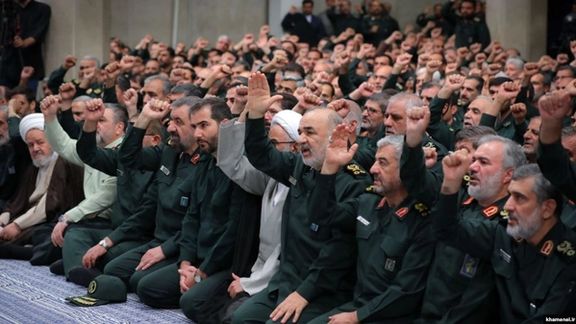
Commander of the Iran’s Revolutionary Guard’s Khatam al-Anbiya contracting arm says they received crude oil in exchange for government debts to its companies.

Commander of the Iran’s Revolutionary Guard’s Khatam al-Anbiya contracting arm says they received crude oil in exchange for government debts to its companies.
Brigadier General Hossein Housh-Sadat said on Wednesday that the Khatam-al Anbiya base will sell the crude through some “organizations that are legal” without elaborating on how the IRGC would sell the oil.
He said parts of the proceeds from the oil sales would be used to settle debts to contractors and some other parts will be allocated to new projects. The IRGC business conglomerate, with its flagship Khatam al-Anbiya “base” is the largest concern in the country, receiving many government contracts without competition.
Earlier in February, the spokesman of the parliament's budget review committee, Rahim Zare’, said the IRGC base will get 20 trillion rials ($80 million) worth of crude oil to finish construction projects for the country’s prayer grounds.
The administration of President Ebrahim Raisi is giving a lot of projects to different sections of the IRGC in return for crude oil that Tehran cannot sell due to sanctions, including a $3 billion project for rice production.
The government has announced that 4.5 billion euros worth of crude oil will be put at the disposal of the armed forces to sell. This means the lion’s share will go to the IRGC, which must find middlemen and illicit ways to export the oil, giving rise to corruption.
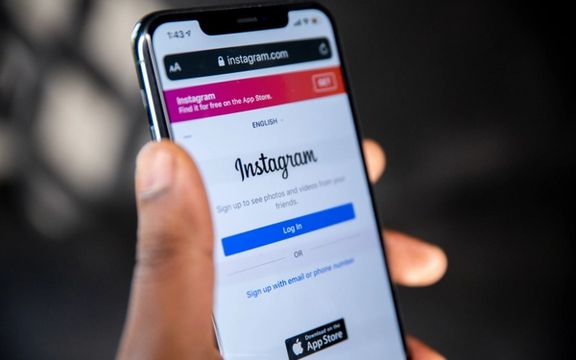
A new move in the parliament to restrict freedom of access to global Internet and popular social media platforms has outraged Iranians from every walk of life.
"You have no right to treat people as if they aren't able to make decisions for themselves or as if they are mentally incapacitated…Representatives of people have no right to act against the wishes of their constituents. You can't impose something if people don't want it, even if it's against what you deem beneficial to them," Masoud Pirhadi, chief editor of conservative Resalat newspaper tweeted Tuesday in reaction to the approval of the general outlines of a bill to enforce restrictions on the internet and access to various apps and platforms.
An ad hoc parliamentary committee on Tuesday approved the outlines of the controversial bill ironically entitled 'Legislation to Protect Cyberspace Users'. The legislation results in broad restriction of social messaging platforms and access to the global net, in addition to extensive blockage of thousands of websites and most social media platforms.
Hours later, the parliament's own Regulations and Bylaws Division in a statement said the committee had broken the law in ratifying a different version of the bill referred to it for examination and approval.
Those behind the hasty approval of the outlines of the bill, however, are adamant that their move was legal.
The committee's move added salt to the wounds of many who have been affected by the growing plunge in the speed of internet in the past two months. The slow internet has affected many areas of life from navigation of taxis and cars to tens of thousands of large and small online businesses that rely on Instagram, as well as government and public online services.
Slow speed also disrupts access to circumvention software and VPNs which an overwhelming majority of Iranians routinely use to access blocked websites and applications including platforms such as Facebook and You Tube and messaging applications such as WhatsApp.
Authorities also appear to have. simultaneously reduced the bandwidth for Instagram and WhatsApp which makes them very hard or impossible to access.
Speaking at a cabinet meeting Wednesday, President Ebrahim Raisi tried to calm the public by saying that the communications ministry must provide "safe, high quality, and fast internet" to the people.
Many immediately took to social media to tell Raisi that "safe" is only another word for "censored", as the government and parliament have used the term in Persian. They republished remarks by Abdolnaser Hemmati, Raisi's rival, during the election debates in June about the president's vision of "safe internet": " Iran is not North Korea, Mr Raisi. Your 'safe internet' means shutting down Instagram!".
Criticism of the parliament and government's plans for restricting internet freedom is not limited to the opposition. Resalat newspaper, the mouthpiece of the Islamic Coalition Party (Motalefeh), in an editorial Wednesday criticized the plan. "Tyranny is haram in Islam," the editorial said, meaning religiously forbidden.
"How can we expect people not to be afraid of wide-ranging filtering [of websites]? How can we expect people not to be reminded of November 2019 [anti-government protests]?" the editorial asked in a clear reference to the nearly complete internet blackout for over a week during the protests.
"The rulers must not impose something on people even if it is reasonable, which in this case it definitely is not, and people are strongly against it, which in this case they definitely are, and should surrender to people's will even if it is a misstep," Resalat wrote.
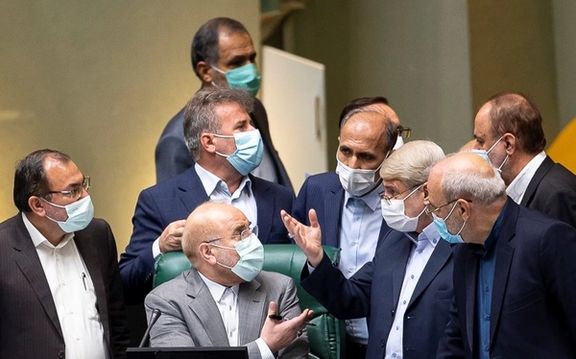
The Speaker of Iran's parliament Mohammad Bagher Ghalibaf has come under fire from conservatives after being implicated in a major financial corruption case.
Many among the public and some reformist politicians have also demanded a serious probe, leaving the Speaker vulnerable to serious pressure.
Earlier this month a leaked audio tape resurfaced in which two top Revolutionary Guard generals, former commander-in-chief Mohammad Ali Jafari and his deputy for financial affairs Sadeq Zolqadrnia are heard discussing a major corruption case. The top-secret tape revealed that over $3 billion disappeared in an IRGC-linked company and is still unaccounted for after several years.
Ghalibaf’s name comes up in the recording as the lead person who as mayor of Tehran at the time wants to cover up the embezzlement by involving the city administration in a fake contract to account for the lost money.
Hardliner cleric Hamid Rasaei, who is a member of the largest ultra-conservative faction in parliament (Majles), has charged in an article that Ghalibaf's aides clamp down on anyone who even thinks that the Speaker was involved in financial corruption.
Rasaei wrote: "The members of a clan who worship Ghalibaf do not like anyone to talk about the matter or criticize him." He was pointing to those aides who have tried to protect Ghalibaf from corruption allegations using his friendship with former IRGC Qods Force commander Qasem Soleimani, killed in a US drone strike in January 2020.
If you do criticize Ghalibaf, said Rasaei in a series of tweets, then you will come under attack by the pro-Ghalibaf media artillery. He posted screenshots of articles on several websites that attacked him and reformist activist Mostafa Tajzadeh who has also asked why nobody probes the financial case involving Ghalibaf.
Ghalibaf supporters have argued that Soleimani knew about the dealings in question and therefore the affair had nothing corrupt in it.
Rasaei has also written to the head of the Iranian armed forces judicial office asking it to shed light on the contents of the leaked audio file, without mentioning Ghalibaf.
He also charged that Ghalibaf's media adviser has tarnished the image of the IRGC and Soleimani to protect his boss.
Meanwhile prominent conservative activist Hossein Kanani Moghaddam told the press that it was unfair to sacrifice Soleimani’s reputation to protect Ghalibaf. He called on IRGC commanders and particularly former commander Mohammad Ali Jafari to shed light on the case and not allow Ghalibaf’s aides to tarnish Soleimani's image. He called the actions of an aide "a plot against Soleimani and the IRGC," a damning accusation that could entail dangerous repercussions.
"It was an unmanly act to try to whitewash Ghalibaf's corruption by levelling accusations against Soleimani," Kanani Moghaddam said. He also called on Ghalibaf to be accountable for what he has done to save the IRGC's face.
The attacks on Ghalibaf are however, not solely motivated by a desire to restore justice. Most of the attacks come from the members and media outlets of the ultraconservative Paydari Party, Ghalibaf's main rival at the parliament. During the past two years, Ghalibaf gave or solicited top jobs for his rivals in Paydari to establish his role as the speaker of the Majles. Now Paydari appears to be poised to unseat Ghalibaf when an annual election for Majles Speaker is slated to take place.
The only one who can save Ghalibaf and help him out of the trouble, is Ghalibaf’s relative, Iran’s Supreme Leader Ali Khamenei who saved him once by ordering everyone not to dwell on the case when it first surfaced in 2017.
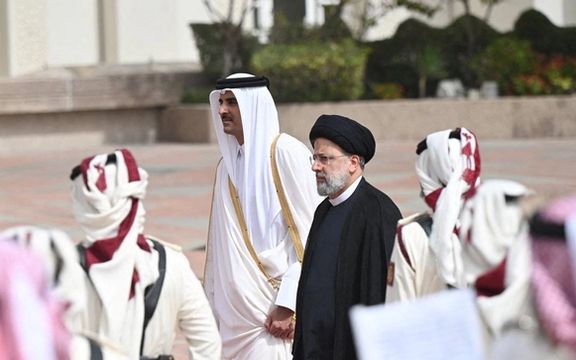
Iranian President Ebrahim Raisi told gas exporters in Qatar on Tuesday to avoid any "cruel" sanctions such as those imposed by the United States on Tehran.
Meanwhile, the spokesman of his government said any revival of Iran's 2015 nuclear accord with world powers must lift US sanctions.
"The members of this forum should not recognize those sanctions...(because) in today's world we see that the sanctions are not going to be effective," Raisi said in a gas exporters gathering.
Reuters reported last week that a US-Iranian deal is taking shape in Vienna after months of indirect talks to revive the nuclear pact abandoned in 2018 by then-US President Donald Trump, who also reimposed extensive sanctions on Iran.
"Any sanctions that ... deal a blow to Iran's economic benefits from the (nuclear) deal must be lifted," cabinet spokesman Ali Bahadori Jahromi told a news briefing carried live on a state-run website.
Since 2019, Tehran has gone well beyond the deal's limits, rebuilding stockpiles of enriched uranium, refining it to higher fissile purity and installing advanced centrifuges to speed up output.
Iran had demanded legal assurances that the United States will not exit the deal again, but Washington says it is impossible for US President Joe Biden to provide them.
A draft text of the agreement also alluded to other issues, including unfreezing billions of dollars in Iranian funds in South Korean banks, and the release of Western prisoners held in Iran.
Reporting by Reuters
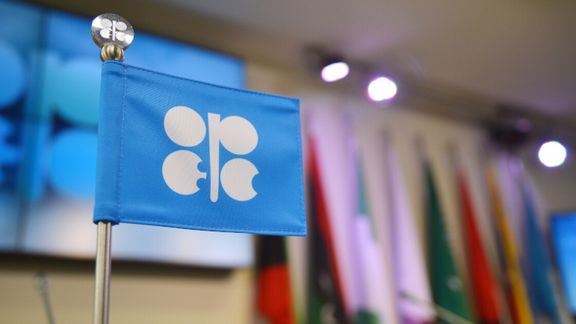
There is no need for OPEC+ to expand its oil production, Nigeria's petroleum minister said on Tuesday, as the group sees a potential deal between Iran and world powers unlocking more supplies.
"We don't have do anything extraordinary this time because we are expecting a lot of production," Timipre Sylva said on the sidelines of a gas exporters conference in Qatar's capital Doha.
OPEC+ cut supplies in 2020 as the COVID pandemic reduced global demand but began marginally increasing supplies. However overall production has remained well below pre-pandemic levels bossting prices to 7-year highs of close to $100 per barresl.
"We are expecting more production if a nuclear deal with Iran works out (since) there will be production from them," Sylva added.
Months of indirect talks between Iran and the United States to revive a 2015 nuclear deal abandoned in 2018 by then-US President Donald Trump are in their final stage, diplomats have been saying, although some still believe major issues remain to be resolved.
A deal could pave the way for OPEC member Iran to raise its oil exports further, helping to ease what many analysts see as an acute tightness in the oil market.
Brent crude traded just below $100 a barrel on Tuesday, its highest since September 2014, as the possibility of a Russian invasion of Ukraine heightened the risk of supply disruptions.

Israel has urged the United States not to remove Iran’s Revolutionary Guard (IRGC) from its list of terrorist groups, as nuclear talks in Vienna near a conclusion.
Foreign Minister Yair Lapid said on Monday, “The terrible nuclear deal is about to be signed in Vienna. Iran is seeking to cancel the Revolution Guard’s listing as a terrorist organization. If they’re not a terror group, then what are they? A folk dancing troupe?”
He pointed out that the IRGC – which has been designated as a terror group since 2019 -- sponsors Hezbollah, Palestinian Islamic Jihad, and the Houthis, noting that “The world cannot agree to these audacious conditions. It cannot allow tens of billions of dollars to flow to Iran nor allow it to continue to spread terror around the world.”
“In another two and a half years, the restrictions on Iran will disappear. It will be able to return to its activity with advanced centrifuges and enrich uranium for a bomb”, he said.
Earlier Monday, Lapid called on participants of the Conference of Presidents of Major American Jewish Organizations in Jerusalem to ensure that the IRGC is not removed from the terrorist list.
“Everyone in their right mind should go to the Biden administration and say ‘this is wrong, don't do this,’” he said.
Prime Minister Naftali Bennett on Sunday warned that the emerging deal will “likely create a more violent, more volatile Middle East,” said Iran would use freed-up assets to target Israel.